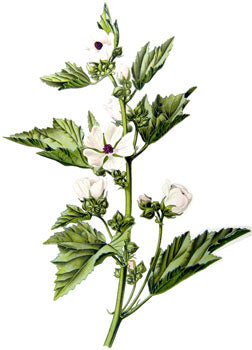Herb Article
Marshmallow
Tzuria Malpica, certified clinical herbalist

Herb
Marshmallow
Latin Name
Althea officinalis
Family
Malvaceae
Parts used
Most commonly root. Leaves and flowers occasionally used
Medicinal Properties
As an herbalist working in the dry climate of Colorado, I find Marshmallow to be one of the most useful herbs. Classified as demulcent, emollient, and diuretic, Marshmallow is often used to soothe cracked, dry, and irritated tissues. The name Althea derives from a Greek word meaning "to heal". This European native now grows across North America, and is a known relative of the common garden plant Hollyhock. You may have heard the word mucilaginous used to describe this Marshmallow. Mucilage refers to the thick viscous quality seen in an extraction of this herb. The mucilage constituents have traditionally been used to soothe inflammation, moisten the mucous membranes and cool the system.
Marshmallow has a particular affinity for the digestive and respiratory systems and the urinary tract. I see this herb to be especially useful when the body feels dried out and over heated. It is particularly valued for inflammatory bowel conditions such as Crohn's disease and colitis.
Herbalists have used Marshmallow for pain of kidney stones and difficult or painful urination due to inflammation. Author and herbalist, Mathew Wood says that Marshmallow as an emollient can soften and break up hard tissues and is thought to be palliative or curative to any hot, dry, or hard condition. Working with the kidneys, Marshmallow can help the body retain water and at the same time can also help the body release excess moisture. It can be used for both people with excessive thirst or for people with no thirst but excessive urination.
In the respiratory system Marshmallow is traditionally employed for dry coughs that are accompanied by a dry and irritated sore throat. I find that Marshmallow works for any respiratory condition with symptoms of low mucous production and/or a non-productive cough. It can help support the mucous membranes to heal, to produce proper mucous flow, and to decrease congestion. Marshmallow has also been used to support people going through chemotherapy. It aids in nourishing the individual and helping them handle the treatment more easily. Historically, Marshmallow has been used externally to soothe inflammatory skin conditions such as ulcers, sores, rashes, skin irritations, bites, cuts, scrapes and burns. A simple wash of Marshmallow may be applied to eczema or psoriasis to provide its soothing relief.
Marshmallow lends its sweet nourishing energy quite nicely to almost any formula. Most herbs have a drying action that can be aggravated by our dry mountain climate. It is often beneficial to add a moistening herb into tea blends to balance the drying effects. The mucilage in Marshmallow is best extracted in cold or room temperature water. The moistening properties will still be present in a warm infusion or decoction. However, when experiencing extreme dryness a cold infusion is most useful.
Fun Fact A confection made with this herb was the inspiration for the candy called marshmallow although in present day the candy contains no trace of the plant.
Cautions and Contraindications
There have been no recorded cautions or contraindications
Preparations & Applications
Tea, capsules, syrups, compress, skin wash, tincture
Recipes
Soak one Tablespoon of Marshmallow root in a cup of room temperature water. Soak 5-15 minutes. This may also be soaked in cold or room temperature water overnight, and then strained and enjoyed throughout the day. The preparation will be thick with mucilage. Try diluting it with your drinking water for the day or adding hot water to make a warm tea.
Mineral Rich Nervous System Support Tea
1pt Raspberry leaf
1 pt Oat Tops
1/2 pt Nettles
1/2 pt Linden
1/2 pt Marshmallow
1/4 pt Catnip
1/4 pt Licorice
a pinch of rose petal
Yummy Tummy Tea
1 pt Marshmallow
1 pt Plantain
1/2 pt Chamomile
1/2 pt Meadowsweet
1/2 pt Fennel
*pt= Part
Resources
Planetary Herbology by Michael Tierra
The Earthwise Herbal: A Complete Guide to Old World Medicinal Plants by Mathew Wood
Medicinal Plants of the Mountain West by Michael Moore
Magic and Medicine of Plants: Readers Digest
Writings by Paul Bergner




